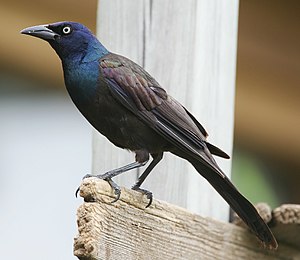Difference between revisions of "Field Guide/Birds/Quiscalus quiscula"
m (- Category of AYHAB) |
|||
| (55 intermediate revisions by 12 users not shown) | |||
| Line 1: | Line 1: | ||
| − | + | {{Bird id | |
| − | + | | name = Common Grackle | |
| − | + | | latin_name = Quiscalus quiscula | |
| − | + | | level = 4 | |
| − | + | | image_1 = Quiscalus-quiscula-001.jpg | |
| − | + | | caption_1 = Common Grackle | |
| − | + | | description = The {{units|32 cm|12.5 inch}} long adults have a long dark bill, a pale yellowish eye and a long tail; their plumage is an iridescent black. Adult females are slightly smaller and less glossy. | |
| − | |||
| − | |||
| − | |||
| − | |||
| − | |||
| − | |||
| − | |||
| − | |||
| − | + | Their breeding habitat is open and semi-open areas across North America east of the Rocky Mountains. The nest is a well-concealed cup in dense trees (particularly pine) or shrubs, usually near water; sometimes, they will nest in cavities or in man-made structures. They often nest in colonies, some being quite large. | |
| − | The | ||
| − | + | This bird is a permanent resident in much of its range. Northern birds migrate in flocks to the southeastern United States. | |
| − | + | These birds forage on the ground, in shallow water or in shrubs; they will steal food from other birds. They are omnivorous, eating insects, minnows, frogs, eggs, berries, seeds and grain, even small birds. | |
| − | + | This bird's song is particularly harsh, especially when these birds, in a flock, are calling. | |
| − | |||
| − | |||
| − | |||
| − | This bird's song is particularly harsh, especially when a flock | ||
The range of this bird expanded west as forests were cleared. In some areas, they are now considered a pest by farmers because of their large numbers and fondness for grain. | The range of this bird expanded west as forests were cleared. In some areas, they are now considered a pest by farmers because of their large numbers and fondness for grain. | ||
| + | }} | ||
Latest revision as of 03:53, 15 July 2022
| Quiscalus quiscula (Common Grackle) | |
|---|---|
| Description | |
| The 32 cm Their breeding habitat is open and semi-open areas across North America east of the Rocky Mountains. The nest is a well-concealed cup in dense trees (particularly pine) or shrubs, usually near water; sometimes, they will nest in cavities or in man-made structures. They often nest in colonies, some being quite large. This bird is a permanent resident in much of its range. Northern birds migrate in flocks to the southeastern United States. These birds forage on the ground, in shallow water or in shrubs; they will steal food from other birds. They are omnivorous, eating insects, minnows, frogs, eggs, berries, seeds and grain, even small birds. This bird's song is particularly harsh, especially when these birds, in a flock, are calling. The range of this bird expanded west as forests were cleared. In some areas, they are now considered a pest by farmers because of their large numbers and fondness for grain. | |

